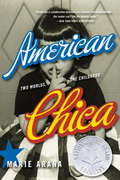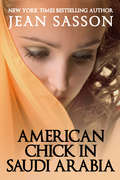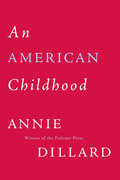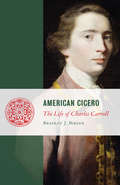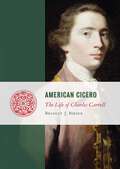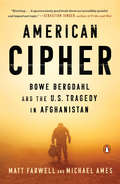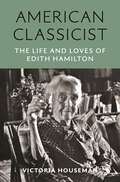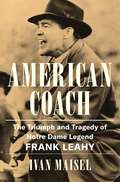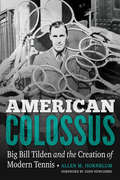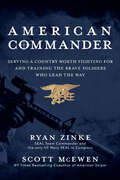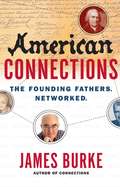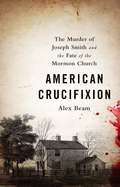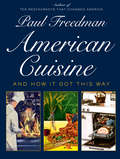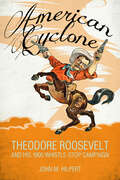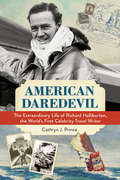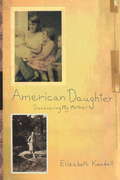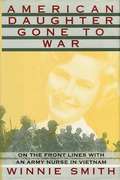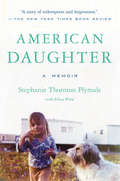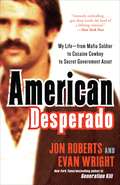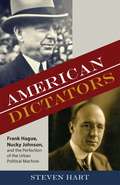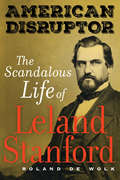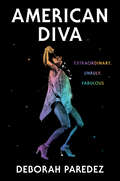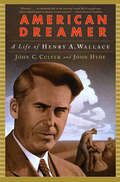- Table View
- List View
American Chica
by Marie AranaIn her father's Peruvian family, Marie Arana was taught to be a proper lady, yet in her mother's American family she learned to shoot a gun, break a horse, and snap a chicken's neck for dinner. Arana shuttled easily between these deeply separate cultures for years. But only when she immigrated with her family to the United States did she come to understand that she was a hybrid American whose cultural identity was split in half. Coming to terms with this split is at the heart of this graceful, beautifully realized portrait of a child who "was a north-south collision, a New World fusion. An American Chica."Here are two vastly different landscapes: Peru--earthquake-prone, charged with ghosts of history and mythology--and the sprawling prairie lands of Wyoming. In these rich terrains resides a colorful cast of family members who bring Arana's historia to life...her proud grandfather who one day simply stopped coming down the stairs; her dazzling grandmother, "clicking through the house as if she were making her way onstage." But most important are Arana's parents: he a brilliant engineer, she a gifted musician. For more than half a century these two passionate, strong-willed people struggled to overcome the bicultural tensions in their marriage and, finally, to prevail.From the Trade Paperback edition.
American Chick in Saudi Arabia
by Jean SassonIt all begins with an ad in the newspaper. When Jean Sasson, a young Southern woman living in Jacksonville Beach, Florida, answers a call to work in the royal hospital in Saudi Arabia, what should have been a two-year stay turns into a life-changing adventure spanning over a decade. Over the years Jean is plunged into the hidden lives of the veiled women in Riyadh, where women are locked in luxurious homes and fundamentalist mutawas terrorize the streets. Jean meets women from all walks of life--a feisty bedouin, an educated mother, a conservative wife of a high-ranking Saudi, and a Saudi princess the world knows as Princess Sultana--all who open a window into Saudi culture and help to reshape Jean's worldviews. AMERICAN CHICK IN SAUDI ARABIA is the first installment in a heartfelt, inspiring memoir about Jean's thirty-year travels and adventures in Saudi Arabia, Lebanon, Kuwait and Iraq.Jean's first book THE RAPE OF KUWAIT, based on her eye witness reporting on the invasion of Kuwait by Iraqi troops, was an immediate bestseller. Her next three books, PRINCESS, PRINCESS SULTANA'S DAUGHTERS, and PRINCESS SULTANA'S CIRCLE, became international sensations as they were the first books to bring to the western world the shocking stories about life for women in Saudi Arabia. Jean is also the author of GROWING UP BIN LADEN: Osama's Wife and Son Take Us into Their Secret World and FOR THE LOVE OF A SON: One Afghan Woman's Quest for Her Stolen Child. Her work has been featured in People, Vanity Fair, The New York Times, The Washington Post, The New Yorker, The New York Post, The Sunday London Times, The Guardian, CNN, FOX & NBC.Still traveling the world, Jean has made her homebase in Atlanta, Georgia where she is a passionate animal rights and women's rights supporter.
American Childhood
by Annie DillardA book that instantly captured the hearts of readers across the country, An American Childhood is Pulitzer Prize-winning author Annie Dillard's poignant, vivid memoir of growing up in Pittsburgh in the 1950s.
American Cicero: The Life of Charles Carroll
by Bradley J. BirzerAristocrat. Catholic. Patriot. Founder.Before his death in 1832, Charles Carroll of Carrollton--the last living signer of the Declaration of Independence--was widely regarded as one of the most important Founders. Today, Carroll's signal contributions to the American Founding are overlooked, but the fascinating new biography American Cicero rescues Carroll from unjust neglect.Drawing on his considerable study of Carroll's published and unpublished writings, historian Bradley J. Birzer masterfully captures a man of supreme intellect, imagination, integrity, and accomplishment. Born a bastard, Carroll nonetheless became the best educated (and wealthiest) Founder. The Marylander's insight, Birzer shows, allowed him to recognize the necessity of independence from Great Britain well before most other Founders. Indeed, Carroll's analysis of the situation in the colonies in the run-up to the Revolution was original and brilliant--yet almost all historians have ignored it. Reflecting his classical and liberal education, the man who would be called "The Last of the Romans" advocated a proper understanding of the American Revolution as deeply rooted in the Western tradition. Carroll even left his mark on the U.S. Constitution despite not assuming his elected position to the Constitutional Convention: by inspiring the creation of the U.S. Senate.American Cicero ably demonstrates how Carroll's Catholicism was integral to his thought. Oppressed because of his faith--Maryland was the most anti-Catholic of the original thirteen colonies--Carroll became the only Roman Catholic to sign the Declaration of Independence and helped legitimize Catholicism in the young American republic.What's more, Birzer brilliantly reassesses the most controversial aspects of Charles Carroll: his aristocratic position and his critiques of democracy. As Birzer shows, Carroll's fears of extreme democracy had ancient and noble roots, and his arguments about the dangers of democracy influenced Alexis de Tocqueville's magisterial work Democracy in America.American Cicero reveals why Founders such as John Adams assumed that Charles Carroll would one day be considered among the greats--and also why history has largely forgotten him.
American Cicero: The Life of Charles Carroll (Lives Of The Founders Ser.)
by Bradley J. BirzerAristocrat. Catholic. Patriot. Founder. Before his death in 1832, Charles Carroll of Carrollton—the last living signer of the Declaration of Independence—was widely regarded as one of the most important Founders. Today, Carroll's signal contributions to the American Founding are overlooked, but the fascinating new biography American Cicero rescues Carroll from unjust neglect. Drawing on his considerable study of Carroll's published and unpublished writings, historian Bradley J. Birzer masterfully captures a man of supreme intellect, imagination, integrity, and accomplishment. Born a bastard, Carroll nonetheless became the best educated (and wealthiest) Founder. The Marylander's insight, Birzer shows, allowed him to recognize the necessity of independence from Great Britain well before most other Founders. Indeed, Carroll's analysis of the situation in the colonies in the run-up to the Revolution was original and brilliant—yet almost all historians have ignored it. Reflecting his classical and liberal education, the man who would be called "The Last of the Romans" advocated a proper understanding of the American Revolution as deeply rooted in the Western tradition. Carroll even left his mark on the U.S. Constitution despite not assuming his elected position to the Constitutional Convention: by inspiring the creation of the U.S. Senate. American Cicero ably demonstrates how Carroll's Catholicism was integral to his thought. Oppressed because of his faith—Maryland was the most anti-Catholic of the original thirteen colonies—Carroll became the only Roman Catholic to sign the Declaration of Independence and helped legitimize Catholicism in the young American republic. What's more, Birzer brilliantly reassesses the most controversial aspects of Charles Carroll: his aristocratic position and his critiques of democracy. As Birzer shows, Carroll's fears of extreme democracy had ancient and noble roots, and his arguments about the dangers of democracy influenced Alexis de Tocqueville's magisterial work Democracy in America. American Cicero reveals why Founders such as John Adams assumed that Charles Carroll would one day be considered among the greats—and also why history has largely forgotten him.
American Cipher: Bowe Bergdahl and the U.S. Tragedy in Afghanistan
by Matt Farwell Michael AmesThe explosive narrative of the life, captivity, and trial of Bowe Bergdahl, the soldier who was abducted by the Taliban and whose story has served as a symbol for America's foundering war in Afghanistan <P><P>Private First Class Bowe Bergdahl left his platoon's base in eastern Afghanistan in the early hours of June 30, 2009. <P><P>Since that day, easy answers to the many questions surrounding his case--why did he leave his post? What kinds of efforts were made to recover him from the Taliban? And why, facing a court martial, did he plead guilty to the serious charges against him?--have proved elusive. <P><P>Taut in its pacing but sweeping in its scope, American Cipher is the riveting and deeply sourced account of the nearly decade-old Bergdahl quagmire--which, as journalists Matt Farwell and Michael Ames persuasively argue, is as illuminating an episode as we have as we seek the larger truths of how the United States lost its way in Afghanistan. <P><P>The book tells the parallel stories of a young man's halting coming of age and a nation stalled in an unwinnable war, revealing the fallout that ensued when the two collided: a fumbling recovery effort that suppressed intelligence on Bergdahl's true location and bungled multiple opportunities to bring him back sooner; a homecoming that served to deepen the nation's already-vast political fissure; a trial that cast judgment on not only the defendant, but most everyone involved. <P><P>The book's beating heart is Bergdahl himself--an idealistic, misguided soldier onto whom a nation projected the political and emotional complications of service. <P><P> Based on years of exclusive reporting drawing on dozens of sources throughout the military, government, and Bergdahl's family, friends, and fellow soldiers, American Cipher is at once a meticulous investigation of government dysfunction and political posturing, a blistering commentary on America's presence in Afghanistan, and a heartbreaking story of a naïve young man who thought he could fix the world and wound up the tool of forces far beyond his understanding.
American Classicist: The Life and Loves of Edith Hamilton
by Victoria HousemanA biography of the remarkable woman whose bestselling Mythology has introduced millions of readers to the classical worldEdith Hamilton (1867–1963) didn’t publish her first book until she was sixty-two. But over the next three decades, this former headmistress would become the twentieth century’s most famous interpreter of the classical world. Today, Hamilton’s Mythology (1942) remains the standard version of ancient tales and sells tens of thousands of copies a year. During the Cold War, her influence even extended to politics, as she argued that postwar America could learn from the fate of Athens after its victory in the Persian Wars. In American Classicist, Victoria Houseman tells the fascinating life story of a remarkable classicist whose ideas were shaped by—and aspired to shape—her times.Hamilton studied Latin and Greek from an early age, earned a BA and MA at Bryn Mawr College, and ran a girls’ prep school for twenty-six years. After retiring, she turned to writing and began a relationship with the pianist and stockbroker Doris Fielding Reid. The two women were partners for more than forty years and entertained journalists, diplomats, and politicians in their Washington, D.C., house. Hamilton traveled extensively around the world, formed friendships with Gertrude Stein and Ezra Pound, and was made an honorary citizen of Athens. While Hamilton believed that the ancient Greeks represented the peak of world civilization, Houseman shows that this suffragist, pacifist, and anti-imperialist was far from an apologist for Western triumphalism.An absorbing narrative of an eventful life, American Classicist reveals how Hamilton’s Greek and Roman worlds held up a mirror to midcentury America even as she strived to convey a timeless beauty that continues to enthrall readers.
American Coach: The Triumph and Tragedy of Notre Dame Legend Frank Leahy
by Ivan MaiselAward-winning sportswriter Ivan Maisel brings the forgotten legend of Notre Dame head football coach Frank Leahy back to life, based on rare and complete access to Fighting Irish football historical archives and the Leahy family. When Frank Leahy retired from Notre Dame after the 1953 season, he had the second‑best record in the history of the game (107‑13‑9, .864), second only to Knute Rockne, his college coach and mentor. Seven decades later, he still does. Rockne created the image of Notre Dame, then a small Catholic university in a remote town in northern Indiana, as the premier college football program in the nation. But it was Leahy who secured that image, with six undefeated seasons and four national championships in an 11-season span. By achievement alone, Leahy should be as beloved as Rockne, who nearly a century after his tragic death remains a legend. Yet Leahy is virtually forgotten today, in many ways a victim of his own insatiable need to compete and win. The University of Notre Dame granted Ivan Maisel rare and complete access to its voluminous cache of historical material, and Maisel has the cooperation of Leahy's family, enabling him to tell the rich story of an archetypal coach who was a celebrity in his day. Leahy made the cover of Time magazine and befriended presidents and movie stars alike. Leahy brought innovation to a program reluctant to change anything Rockne had done. But Leahy rankled opposing coaches and clashed with the priests at Notre Dame who sought to make the university as elite in academia as it had become on the field. These conflicts, coupled with the toll that Leahy&’s innate drive demanded of his health, brought his career to a premature end, hampering his legacy in the years to come. And what a legacy: only Nick Saban and Bear Bryant have won more national titles. The records of iconic coaches such as Bobby Bowden, Woody Hayes, and Eddie Robinson pale in comparison. Not only the Notre Dame fanbase but all college football fans will be hungry to rediscover a man and an era, the story of how Frank Leahy cemented Notre Dame&’s status as the defining program of college football.
American Cocktail
by George Hutchinson Anita Reynolds Howard M. MillerThis is the rollicking, never-before-published memoir of a fascinating woman with an uncanny knack for being in the right place in the most interesting times. Of racially mixed heritage, Anita Reynolds was proudly African American but often passed for Indian, Mexican, or Creole. Actress, dancer, model, literary critic, psychologist, but above all free-spirited provocateur, she was, as her Parisian friends nicknamed her, an "American cocktail. " One of the first black stars of the silent era, she appeared in Hollywood movies with Rudolph Valentino, attended Charlie Chaplin's anarchist meetings, and studied dance with Ruth St. Denis. She moved to New York in the 1920s and made a splash with both Harlem Renaissance elites and Greenwich Village bohemians. An emigre in Paris, she fell in with the Left Bank avant garde, " befriending Antonin Artaud, Man Ray, and Pablo Picasso. Next, she took up residence as a journalist in Barcelona during the Spanish Civil War and witnessed firsthand the growing menace of fascism. In 1940, as the Nazi panzers closed in on Paris, Reynolds spent the final days before the French capitulation as a Red Cross nurse, afterward making a mad dash for Lisbon to escape on the last ship departing Europe. In prose that perfectly captures the globetrotting nonchalance of its author, American Cocktail" presents a stimulating, unforgettable self-portrait of a truly extraordinary woman.
American Colossus: Big Bill Tilden and the Creation of Modern Tennis
by Allen M. Hornblum John NewcombeBabe Ruth, Jack Dempsey, Bobby Jones, and Bill Tilden were the legendary quartet of the “Golden Age of Sports” in the 1920s. They transformed their respective athletic disciplines and captured the imagination of a nation. The indisputable force behind the emergence of professional tennis as a popular and lucrative sport, Tilden’s on-court accomplishments are nothing short of staggering. The first American‑born player to win Wimbledon and a seven‑time winner of the U.S. singles championship, he was the number 1 ranked player for ten straight years. A tall, flamboyant player with a striking appearance, Tilden didn’t just play; he performed with a singular style that separated him from other top athletes. Tilden was a showman off the court as well. He appeared in numerous comedies and dramas on both stage and screen and was a Renaissance man who wrote more than two dozen fiction and nonfiction books, including several successful tennis instructions books. But Tilden had a secret—one he didn’t fully understand himself. After he left competitive tennis in the late 1940s, he faced a lurid fall from grace when he was arrested after an incident involving an underage boy in his car. Tilden served seven months in prison and later attempted to explain his questionable behavior to the public, only to be ostracized from the tennis circuit. Despite his glorious career in tennis, his final years were much constrained and lived amid considerable public shunning. Tilden’s athletic accomplishments remain, as he is arguably the best American player ever. American Colossus is a thorough account of his life, bringing a much-needed look back at one of the world’s greatest athletes and a person whose story is as relevant as ever.
American Commander: Serving a Country Worth Fighting For and Training the Brave Soldiers Who Lead the Way
by Ryan Zinke Scott McEwenIn recent years, the world has learned just what is required to bravely serve America through the navy&’s most elite SEAL Team. Now, for the first time, we hear from their commander.For more than half a decade, Ryan Zinke was a commander at the most elite SEAL unit. A 23-year veteran of the US Navy SEALs, Zinke is a decorated officer and earned two Bronze Stars as the acting commander of Joint Special Forces in Iraq. Zinke trained and commanded many of the men who would one day run the covert operations to hunt down Osama bin Laden and save Captain Phillips (Maersk Alabama). He also served as mentor to now famous SEALs Marcus Luttrell (Lone Survivor) and Chris Kyle (American Sniper).Written with #1 New York Times bestselling co-author of American Sniper, Scott McEwen, American Commander will offer readers the hard-hitting, no-nonsense style the SEALs are known for.When Zinke signs with the US Navy he turns his sights on joining the ranks of the most elite fighting force, the SEALs. He eventually reaches the top of the SEAL Teams as an assault team commander. Zinke shares what it takes to train and motivate the most celebrated group of warriors on earth and then send them into harm&’s way. Through it, he shares his proven problem-solving approach: Situation, Mission, Execution, Command and Control, and Logistics.American Commander also covers Zinke&’s experience in running for Montana&’s sole seat in the United States Congress. Zinke&’s passion for his country shines as he conveys his vision to revitalize American exceptionalism. Scott McEwen and Ryan Zinke take readers behind the scenes and into the heart of America&’s most-feared fighting force. American Commander will inspire a new generation of leaders charged with restoring a bright future for our children&’s children.
American Connections: The Founding Fathers. Networked.
by James BurkeUsing the unique approach that he has employed in his previous books, author, columnist, and television commentator James Burke shows us our connections to the fifty-six men who signed the Declaration of Independence. Over the two hundred-plus years that separate us, these connections are often surprising and always fascinating. Burke turns the signers from historical icons into flesh-and-blood people: Some were shady financial manipulators, most were masterful political operators, a few were good human beings, and some were great men. The network that links them to us is also peopled by all sorts, from spies and assassins to lovers and adulterers, inventors and artists. The ties may be more direct for some of us than others, but we are all linked in some way to these founders of our nation. If you enjoyed Martin Sheen as the president on television's The West Wing, then you're connected to founder Josiah Bartlett. The connection from signer Bartlett to Sheen includes John Paul Jones; Judge William Cooper, father of James Fenimore; Sir Thomas Brisbane, governor of New South Wales; an incestuous astronomer; an itinerant math teacher; early inventors of television; and pioneering TV personality Bishop Fulton J. Sheen, the inspiration for Ramon Estevez's screen name, Martin Sheen.
American Courage
by Herbert W. Warden IIIDrawn from firsthand and historical writings, this book gives voice to the pilgrims, founding fathers, revolutionaries, pioneers, '49ers, cowboys, soldiers, pilots, and the many other heroes who have built the nation.
American Crucifixion: The Murder of Joseph Smith and the Fate of the Mormon Church
by Alex BeamOn June 27, 1844, a mob stormed the jail in the dusty frontier town of Carthage, Illinois. Clamorous and angry, they were hunting down a man they saw as a grave threat to their otherwise quiet lives: the founding prophet of Mormonism, Joseph Smith. They wanted blood. At thirty-nine years old, Smith had already lived an outsized life. In addition to starting his own religion and creating his own "Golden Bible”--the Book of Mormon--he had worked as a water-dowser and treasure hunter. He’d led his people to Ohio, then Missouri, then Illinois, where he founded a city larger than fledgling Chicago. He was running for president. And, secretly, he had married more than thirty women. In American Crucifixion, Alex Beam tells how Smith went from charismatic leader to public enemy: How his most seismic revelation--the doctrine of polygamy--created a rift among his peop≤ how that schism turned to violence; and how, ultimately, Smith could not escape the consequences of his ambition and pride. Mormonism is America’s largest and most enduring native religion, and the "martyrdom” of Joseph Smith is one of its transformational events. Smith’s brutal assassination propelled the Mormons to colonize the American West and claim their place in the mainstream of American history. American Crucifixion is a gripping story of scandal and violence, with deep roots in our national identity.
American Cuisine: And How It Got This Way
by Paul FreedmanWith an ambitious sweep over two hundred years, Paul Freedman’s lavishly illustrated history shows that there actually is an American cuisine. For centuries, skeptical foreigners—and even millions of Americans—have believed there was no such thing as American cuisine. In recent decades, hamburgers, hot dogs, and pizza have been thought to define the nation’s palate. Not so, says food historian Paul Freedman, who demonstrates that there is an exuberant and diverse, if not always coherent, American cuisine that reflects the history of the nation itself. Combining historical rigor and culinary passion, Freedman underscores three recurrent themes—regionality, standardization, and variety—that shape a completely novel history of the United States. From the colonial period until after the Civil War, there was a patchwork of regional cooking styles that produced local standouts, such as gumbo from southern Louisiana, or clam chowder from New England. Later, this kind of regional identity was manipulated for historical effect, as in Southern cookbooks that mythologized gracious “plantation hospitality,” rendering invisible the African Americans who originated much of the region’s food. As the industrial revolution produced rapid changes in every sphere of life, the American palate dramatically shifted from local to processed. A new urban class clamored for convenient, modern meals and the freshness of regional cuisine disappeared, replaced by packaged and standardized products—such as canned peas, baloney, sliced white bread, and jarred baby food. By the early twentieth century, the era of homogenized American food was in full swing. Bolstered by nutrition “experts,” marketing consultants, and advertising executives, food companies convinced consumers that industrial food tasted fine and, more importantly, was convenient and nutritious. No group was more susceptible to the blandishments of advertisers than women, who were made feel that their husbands might stray if not satisfied with the meals provided at home. On the other hand, men wanted women to be svelte, sporty companions, not kitchen drudges. The solution companies offered was time-saving recipes using modern processed helpers. Men supposedly liked hearty food, while women were portrayed as fond of fussy, “dainty,” colorful, but tasteless dishes—tuna salad sandwiches, multicolored Jell-O, or artificial crab toppings. The 1970s saw the zenith of processed-food hegemony, but also the beginning of a food revolution in California. What became known as New American cuisine rejected the blandness of standardized food in favor of the actual taste and pleasure that seasonal, locally grown products provided. The result was a farm-to-table trend that continues to dominate. “A book to be savored” (Stephen Aron), American Cuisine is also a repository of anecdotes that will delight food lovers: how dry cereal was created by William Kellogg for people with digestive and low-energy problems; that chicken Parmesan, the beloved Italian favorite, is actually an American invention; and that Florida Key lime pie goes back only to the 1940s and was based on a recipe developed by Borden’s condensed milk. More emphatically, Freedman shows that American cuisine would be nowhere without the constant influx of immigrants, who have popularized everything from tacos to sushi rolls. “Impeccably researched, intellectually satisfying, and hugely readable” (Simon Majumdar), American Cuisine is a landmark work that sheds astonishing light on a history most of us thought we never had.
American Cyclone: Theodore Roosevelt and His 1900 Whistle-Stop Campaign
by John M. HilpertWhen Theodore Roosevelt entered national politics as the Republicans' nominee for the vice presidency in 1900, he was only forty-one years old. However, he had caught the public's attention with the popular version of his life story. Child of East Coast privilege. Sickly, bespectacled youth. Naturalist and author. Harvard graduate. New York assemblyman. Young widower. Badlands cowboy. Civil Service reformer. Urban police commissioner. Assistant Secretary of the Navy. Rough Rider and war hero. Enemy of political bosses as governor of the nation's most important state. Attentive husband to his second wife, Edith, and the father of six children. Few candidates for the presidency or vice presidency have enjoyed the elevated level of admiration accorded Roosevelt in the waning days of the nineteenth century. Biographers have chronicled every significant period of Roosevelt's life with one exception, and American Cyclone fills that gap. His nomination for the vice presidency was Roosevelt's debut as a candidate for national office. American Cyclone presents the story of his campaign, a whirlwind effort highlighted by an astounding whistle-stop tour of 480 communities across twenty-three states. Eighteen of those states gave a plurality of votes to the McKinley-Roosevelt ticket, a gain of five states for the Republicans over 1896. Everywhere Roosevelt went, admiring throngs and dramatic events helped forge him into the man who would soon be the twenty-sixth president of the United States. Returning from the war, Roosevelt was familiar to millions of people across the country as a determined leader. As he interacted with crowds of hundreds, thousands, and even tens of thousands, Roosevelt felt their eagerness to see and hear him. Accordingly, for the first time, this whistle-stop campaign marks the development of the confidence and maturity that would transform Roosevelt into a national leader.
American Daredevil: The Extraordinary Life of Richard Halliburton, the World's First Celebrity Travel Writer
by Cathryn PrinceWith a polished walking stick and neatly pressed trousers, Richard Halliburton served as an intrepid globetrotting guide for millions of Americans in the 1920s and '30s. Readers waited with bated breath for each new article and book he wrote. During his career, Halliburton climbed the Matterhorn, nearly fell out of his plane while shooting the first aerial photographs of Mt. Everest, and became the first person to swim the Panama Canal. With his matinee idol looks, the Tennessee native was a media darling in an era of optimism and increased social openness. But as the Great Depression and looming war pushed America toward social conservatism, Halliburton more actively worked to hide his homosexuality, burnishing his image as a masculine trailblazer. As chronicled in American Daredevil, Halliburton harnessed the media of his day to gain and maintain a widespread following long before our age of the 24-hour news cycle, and thus became the first celebrity adventure journalist. And during the darkest hours of the Great Depression, Halliburton did something remarkable: he inspired generations of authors, journalists, and everyday people who dreamt of fame and glory to explore the world.
American Daughter
by Elizabeth KendallIn this beautifully crafted book, Elizabeth Kendall tells the story of a family, of a passionate attachment between a mother and a daughter and the sudden tragedy that tears it apart. American Daughter is also a brilliant portrait of wellborn women's lives in cities and towns in the post-World War II era, as Kendall evokes how difficult it was to become anything other than an American daughter, which meant being a dependent woman. Occupying a coveted place in St. Louis's privileged high society, Henry and Betty Kendall seemed to be the American dream come true: six children, a sprawling house, a legacy of higher education at Harvard and Vassar. Yet underneath lay the flawed marriage of an idealistic young woman who made her eldest daughter her best friend and turned civil rights into her salvation. Elizabeth maintained the family silence as eccentricities began to appear in her father's behavior, along with whispers of financial difficulties. She accompanied her mother back to Vassar for a summer program on the home and family, then came into her own, away from her family, at the haven of a girls' summer camp and at Radcliffe. From the war-torn 1940s, when young men in uniform, home on leave, went to debutante parties, through the seismic social changes of the 1960s, Kendall tells the intertwined story of her mother and herself, of their powerful bond and how both shaped their lives in response to it. Unrelentingly honest, rich with humor and insights into families and women's lives, American Daughter is both a poignant portrait of American life at the middle of the twentieth century, and a dual coming-of-age story of a mother and a daughter, united by commitment and love, separated by a fatal accident-and by the vastly different birthrights of their generations.From the Hardcover edition.
American Daughter Gone to War: On the Front Lines with an Army Nurse in Vietnam
by Winnie SmithA former member of the Army Nurse Corps in Vietnam recalls her tour of duty and her difficult adjustment to civilian life.
American Daughter: A Memoir
by Elissa Wald Stephanie Thornton Plymale"Gut-wrenching and absorbing...in the vein of Educated and The Glass Castle."—BOOKLIST"a story of redemption and forgiveness."—MARY BETH KEANE, NEW YORK TIMES BOOK REVIEW"Impressive...Readers will find themselves recalibrating their judgments about villains and victims"–—BOOKPAGE (STARRED REVIEW)For 50 years, Stephanie Plymale kept her past a fiercely guarded secret. No one outside her immediate family would have guessed that her childhood was fraught with every imaginable hardship: a mentally ill mother who was in and out of jails and psych wards throughout Stephanie's formative years, neglect, hunger, poverty, homelessness, truancy, foster homes, a harrowing lack of medical care, and worse.Stephanie, in turn, knew very little about the past of her mother, from whom she remained estranged during most of her adult life. All this changed with a phone call that set a journey of discovery in motion, leading to a series of shocking revelations that forced Stephanie to revise the meaning of almost every aspect of her very compromised childhood.American Daughter is at once the deeply moving memoir of a troubled mother-daughter relationship and a meditation on resilience, transcendence, and redemption. Stephanie's story is unique but its messages are universal, offering insight into what it means to rise above, heal, and forgive.
American Desperado: My Life--From Mafia Soldier to Cocaine Cowboy to Secret Government Asset
by Evan Wright Jon RobertsIn 2008 veteran journalist Evan Wright, acclaimed for his New York Times bestselling book Generation Kill and co-writer of the Emmy-winning HBO series it spawned, began a series of conversations with super-criminal Jon Roberts, star of the fabulously successful documentary Cocaine Cowboys. Those conversations would last three years, during which time Wright came to realize that Roberts was much more than the de-facto “transportation chief” of the Medellin Cartel during the 1980s, much more than a facilitator of a national drug epidemic. As Wright’s tape recorder whirred and Roberts unburdened himself of hundreds of jaw-dropping tales, it became clear that perhaps no one in history had broken so many laws with such willful abandon. Roberts, in fact, seemed to be a prodigy of criminality – but one with a remarkable self-awareness and a fierce desire to protect his son from following the same path. American Desperado is Roberts’ no-holds-barred account of being born into Mafia royalty, witnessing his first murder at the age of seven, becoming a hunter-assassin in Vietnam, returning to New York to become -- at age 22 -- one of the city’s leading nightclub impresarios, then journeying to Miami where in a few short years he would rise to become the Medellin Cartel’s most effective smuggler. But that’s just half the tale. The roster of Roberts’ friends and acquaintances reads like a Who’s Who of the latter half of the 20th century and includes everyone from Jimi Hendrix, Richard Pryor, and O.J. Simpson to Carlo Gambino, Meyer Lansky, and Manuel Noriega. Nothing if not colorful, Roberts surrounded himself with beautiful women, drove his souped-up street car at a top speed of 180 miles per hour, shared his bed with a 200-pound cougar, and employed a 6”6” professional wrestler called “The Thing” as his bodyguard. Ultimately, Roberts became so powerful that he attracted the attention of the Republican Party’s leadership, was wooed by them, and even was co-opted by the CIA for which he carried out its secret agenda. Scrupulously documented and relentlessly propulsive, this collaboration between a bloodhound journalist and one of the most audacious criminals ever is like no other crime book you’ve ever read. Jon Roberts may be the only criminal who changed the course of American history. From the Hardcover edition.
American Dictators: Frank Hague, Nucky Johnson, and the Perfection of the Urban Political Machine (Rivergate Regionals Collection)
by Steven HartAmerican Dictators is the dual biography of two of America's greatest political bosses: Frank Hague and Enoch "Nucky" Johnson. The book shows Hague and Johnson at the peak of their power and the strength of their political machines during the years of Prohibition and the Great Depression. Steven Hart describes how both men used their influence to benefit and punish the local citizenry, amass huge personal fortunes, and sometimes collaborate to trounce their enemies.
American Disruptor: The Scandalous Life of Leland Stanford
by Roland De WolkAmerican Disruptor is the untold story of Leland Stanford – from his birth in a backwoods bar to the founding of the world-class university that became and remains the nucleus of Silicon Valley. The life of this robber baron, politician, and historic influencer is the astonishing tale of how one supremely ambitious man became this country's original "disruptor" – reshaping industry and engineering one of the greatest raids on the public treasury for America’s transcontinental railroad, all while living more opulently than maharajas, kings, and emperors. It is also the saga of how Stanford, once a serial failure, overcame all obstacles to become one of America’s most powerful and wealthiest men, using his high elective office to enrich himself before losing the one thing that mattered most to him – his only child and son. Scandal and intrigue would follow Stanford through his life, and even after his death, when his widow was murdered in a Honolulu hotel – a crime quickly covered up by the almost stillborn university she had saved. Richly detailed and deeply researched, American Disruptor restores Leland Stanford’s rightful place as a revolutionary force and architect of modern America.
American Diva: Extraordinary, Unruly, Fabulous
by Deborah ParedezAn impassioned homage to the divas who shake up our world and transform it with their bold, dazzling artistry. What does it mean to be a “diva”? A shifting, increasingly loaded term, it has been used to both deride and celebrate charismatic and unapologetically fierce performers like Aretha Franklin, Divine, and the women of Labelle. In this brilliant, powerful blend of incisive criticism and electric memoir, Deborah Paredez—scholar, cultural critic, and lifelong diva devotee—unravels our enduring fascination with these icons and explores how divas have challenged American ideas about feminism, performance, and freedom. American Diva journeys into Tina Turner’s scintillating performances, Celia Cruz’s command of the male-dominated salsa world, the transcendent revival of Jomama Jones after a period of exile, and the unparalleled excellence of Venus and Serena Williams. Recounting how she and her mother endlessly watched Rita Moreno’s powerhouse portrayal of Anita in West Side Story and how she learned much about being bigger than life from her fabulous Tía Lucia, Paredez chronicles the celebrated and skilled performers who not only shaped her life but boldly expressed the aspiration for freedom among brown, Black, and gay communities. Paredez also traces the evolution of the diva through the decades, dismayed at the mid-aughts’ commodification and juvenilizing of its meaning but finding its lasting beauty and power. Filled with sharp insights and great heart, American Diva is a spirited tribute to the power of performance and the joys of fandom.
American Dreamer: A Life of Henry A. Wallace
by John Hyde John C. CulverThe great politician, agriculturalist, economist, author, and businessman--loved and reviled, and finally now revealed. The great politician, agriculturalist, economist, author, and businessman--loved and reviled, and finally now revealed. The first full biography of Henry A. Wallace, a visionary intellectual and one of this century's most important and controversial figures. Henry Agard Wallace was a geneticist of international renown, a prolific author, a groundbreaking economist, and a businessman whose company paved the way for a worldwide agricultural revolution. He also held two cabinet posts, served four tumultuous years as America's wartime vice president under FDR, and waged a quixotic campaign for president in 1948. Wallace was a figure of Sphinx-like paradox: a shy man, uncomfortable in the world of politics, who only narrowly missed becoming president of the United States; the scion of prominent Midwestern Republicans and the philosophical voice of New Deal liberalism; loved by millions as the Prophet of the Common Man, and reviled by millions more as a dangerous, misguided radical. John C. Culver and John Hyde have combed through thousands of document pages and family papers, from Wallace's letters and diaries to previously unavailable files sealed within the archives of the Soviet Union. Here is the remarkable story of an authentic American dreamer. A Washington Post Best Book of the Year. 32 pages of b/w photographs. "A careful, readable, sympathetic but commendably dispassionate biography."--Arthur Schlesinger, Jr., Los Angeles Times Book Review "In this masterly work, Culver and Hyde have captured one of the more fascinating figures in American history."--Doris Kearns Goodwin, author of No Ordinary Time "Wonderfully researched and very well written...an indispensable document on both the man and the time."--John Kenneth Galbraith "A fascinating, thoughtful, incisive, and well-researched life of the mysterious and complicated figure who might have become president..."--Michael Beschloss, author of Taking Charge: The Johnson White House Tapes, 1963-1964 "This is a great book about a great man. I can't recall when--if ever--I've read a better biography."--George McGovern "[A] lucid and sympathetic portrait of a fascinating character. Wallace's life reminds us of a time when ideas really mattered."--Evan Thomas, author of The Very Best Men: The Early Years of the CIA "Everyone interested in twentieth-century American history will want to read this book."--Robert Dallek, author of Flawed Giant "[T]he most balanced, complete, and readable account..."--Walter LaFeber, author of Inevitable Revolutions "At long last a lucid, balanced and judicious narrative of Henry Wallace...a first-rate biography."--Douglas Brinkley, author of The Unfinished Presidency "A fine contribution to twentieth-century American history."--James MacGregor Burns, author of Dead Center: Clinton-Gore Leadership and the Perils of Moderation "[E]minently readable...a captivating chronicle of American politics from the Depression through the 1960s."--Senator Edward M. Kennedy "A formidable achievement....[an] engrossing account."--Kai Bird, author of The Color of Truth: McGeorge Bundy & William Bundy, Brothers in Arms "Many perceptions of Henry Wallace, not always favorable, will forever be changed."--Dale Bumpers, former US Senator, Arkansas
